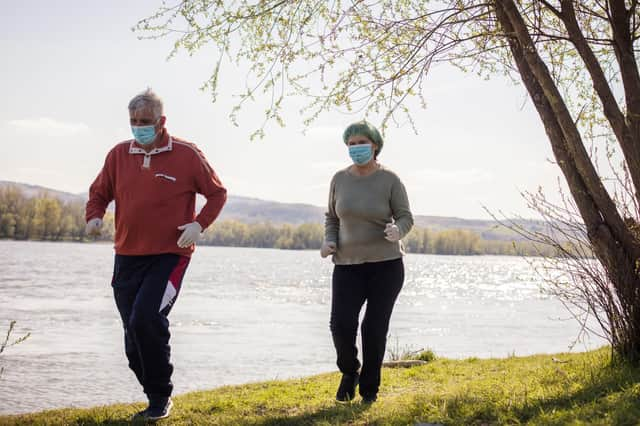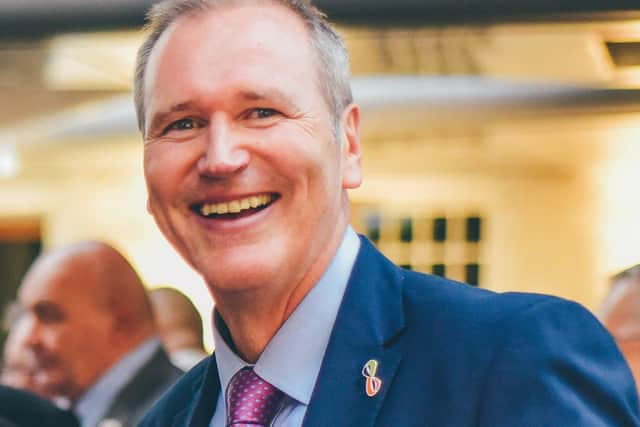Call to boost support for elderly sport to help improve the health of the nation


Age Scotland Chief Executive Brian Sloan has been at the epicentre of the challenges faced by Scotland’s older people, and he is urging the new Scottish Government to look more closely at the value of local sports club networks for older people, and using existing facilities more effectively, as part of the national Covid recovery effort.
He warned, however, that Scotland needs to work fast to change their current course and make physical exercise more widely available to all if that recovery is to impact on people from 50-year-olds up.
Advertisement
Hide AdAdvertisement
Hide Ad

Speaking to the Scotsman as part of our campaign with the Observatory for Sport in Scotland (OSS) to encourage a ‘National Conversation on Sport’s Role in Society’, he explained how the charity was working to establish a sports network for the elderly across Scotland within the next five years.
“We have worked with the Observatory on this area,” explained Brian, “and what we were talking about prior to the pandemic has just been brought into sharp focus the simple message - whatever activity you play, or played, and whatever age you are, for the health of the country we need to find ways for you to stay involved.
“We know older people have been the most heavily hit by covid,” he said. “Long-term health conditions will almost certainly rise, whether as a result of people not going to hospital for check-ups, a back-log of cancer cases or through the stress of such a long isolation, so it is important to devise a preventative model - and that could be getting more people participating in sport and exercise.
“Sadly though if you look at the lack of sports and opportunities for older people - older people just aren’t high priority.”
The OSS Manifesto is calling for a ‘National Conversation’ that would engage with people of all ages, and ensure Age Scotland is at the table as part of a new national strategic focus, to support the development of local clubs for ‘senior sport’. The organisation is already leading on using sport as a tool to bring older people together.
The charity wsa already working to establish sports clubs for the elderly when the pandemic hit, and is hoping to speed-up the work once lockdowns have ended.
“Before the pandemic we were at a good stage of progress with Edinburgh Academicals, who have good facilities which, during most days, can be left lying virtually unused,” explained Brian.
“They really wanted to do it, and we were just starting to build momentum on the sports clubs when covid hit, so hopefully we can pick that up again soon."
Advertisement
Hide AdAdvertisement
Hide AdResearch has shown there is a wealth of facilities across the country, from small halls, church halls, schools and sports clubs, that could be used to help.
“We are saying that instead of letting it lie unused it could be an old persons club house, they could have meetings, hold walking sports on the pitches, organise a weekly calendar of events,” said Brian.
“Ultimately we want to see these clubs being the norm - and ideally they would be ‘hubs’, with other local facilities like tennis clubs or bowling clubs being spokes, all working in partnership to get as many people active as possible.”
For Age Scotland, ensuring people of all ages can take part in some kind of sport or physical activity is seen as a vital part of helping with health and well-being - and the charity have suggested there should be greater cross-over between sports and health providers.
“We are an ageing population, and ageing more rapidly than any other part of the UK, and that is creating lots of challenges,” says Brian.
It is not just that we are ageing though. Currently there are more than two million people over 50, making up 40 per cent of the population. Over the next two decades, it is estimated that a quarter of the population will be over 65s, and there will be a 70 per cent increase in the number of people over 75 years old.
Life expectancy is going up - but healthy life expectancy is going down. Recent analysis found that the average life expectancy of women in Scotland was 81.1 years, while for men it was 77 years. But the healthy life expectancy - the number of years a person can expect to live without serious degenerative illness - was 62.6 years for women and 62.3 years for men.
That means that on average people will have 15 years of living with a long-term health condition - and there are concerns the impact of covid could increase that by reversing gains on improving lifestyle.
Advertisement
Hide AdAdvertisement
Hide AdAlready one in every two people over 65 have a long term health condition. There are huge concerns about the next generation, with reports suggesting current 18-20 years olds were so sedentary even before they were locked down for a year that there will be major health issues later in life.
When you start thinking about the cost of that to the NHS, and the rising cost of social care, it becomes clear that we need a long-term vision to improve the health of the nation.
And that is what Age Scotland is hoping to help provide.
“I certainly think there should be greater integration between health and social care and sport providers,” says Brian.
“Our goal is to provide greater opportunity for all older people to take part in a sport or activity they enjoy, and in government terms that ticks a lot of boxes. It helps tackle loneliness and isolation, it improves health and well-being and it encourages sports participation and volunteering.”
Getting people to take part in physical activity is not just about helping with physical health however.
A 2018 study into the benefits of participating in sport found that it increased social health, reduced loneliness, and led to improved fitness, injury rehabilitation and overall reduced the effects of ageing.
Some mental health benefits were also suggested, such as increasing relaxation and improving self-confidence. Participants also said they took personal benefits from sport, through improved relations with family members and the opportunity to play sports with younger generations such as grandchildren.
“Loneliness and isolation, for example, even pre-pandemic was already a massive issue among Scotland’s older generation,” says Brian. “We knew 100,000 older people who felt lonely all of the time, 250,000 said the TV or pet was their main form of company.
Advertisement
Hide AdAdvertisement
Hide Ad“Many older people have been shielding so it’s only going to be worse now.
“Loneliness is as bad as smoking 15 a day - so it will lead to more health issues. This is more important than ever in a covid recovery plan, If you’re keeping physically and socially and mental engaged.
“That’s why we see it as so important as it would be a great preventative strategy for older people.
“Whatever age you are, there will be some form of physical activity you can benefit from, and it is about increasing the opportunities for people and creating a situation where age isn’t seen as a barrier to sport.”
If that sounds unachievable, it is not - there are already examples of countries such as Denmark where sport among older people is considered so normal they are almost struggling to meet demand.
The key thrust of the OSS manifesto is for work by SportScotland, leisure trusts and other sport providers to be more obviously widened in Scotland, as it is in other European countries, in a stronger strategic partnership across health, education and the business community that uses sport activity, in all shapes and forms, as that kind of tool to engage all ages and abilities in their community.
Nick Rowe, the OSS Head of Research, said: "In Denmark, the profile of participation by age is, at least from the perspective of our shores, quite remarkable with older people as likely to take part in sport as their much younger counterparts. This evidence challenges the implicit assumption often underpinning attitudes towards sports policy in the UK that the decline in participation in sport as people get older is inevitable and the best we can do is attenuate it.
"Some of the broad challenges facing sport are not unique to Scotland. Even in countries like the Netherlands and Denmark which set the bar there are signs of participation coming under pressure with the possibility of rates stagnating or decreasing.
Advertisement
Hide AdAdvertisement
Hide Ad"It is also illustrative to understand that the social structuring of sport is not unique to Scotland or the UK and that countries like the Netherlands face similar challenges to Scotland when it comes to widening the participation base to reach sections of society that experience disadvantage and relative poverty."
